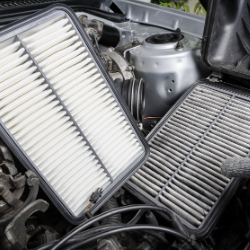Underwater Finance
By Brian Alexander, Content Editor
So you’ve been choking down a five-year car loan for a few years now. When you bought the car, it seemed like the logical thing to do – sure you end up paying a little more in the end, but it stretches out those pesky monthly payments and knocks them down to an acceptable level.
Besides, what’s two more years, right?
Unfortunately, you may have put yourself in a position where depreciation can play a dirty trick on you, especially if you are looking to sell your car after only a few years of ownership. If your vehicle depreciates too quickly, you may find yourself “underwater."
What Does It Mean to Be “Underwater?"
Don’t take the term literally – no one will throw you off a dock because your vehicle’s resale value took a major hit (or at least, we hope no one will) – it’s simply financial jargon for a fittingly unpleasant situation.
Basically, if you owe more money on your loan than your car is worth, you’re underwater. The term describes what is known in traditional finance as “negative equity," and it goes without saying that it’s no picnic.
Don’t take the term literally – no one will throw you off a dock because your vehicle’s resale value took a major hit (or at least, we hope no one will) – it’s simply financial jargon for a fittingly unpleasant situation.
Basically, if you owe more money on your loan than your car is worth, you’re underwater. The term describes what is known in traditional finance as “negative equity," and it goes without saying that it’s no picnic.
If you buy a large domestic truck today, you risk seeing up to a 50 percent loss of value in the first year of ownership. If you’ve only paid 15 percent of your loan off in that first year, you owe more on the truck than it is worth on the market.
Don’t panic. Before you check the resale value of your car and start hyperventilating into a bag, know that simply being underwater isn’t necessarily a dangerous scenario. There are two types of underwater equity: Unrealized underwater and realized underwater.
Unrealized underwater means you owe more than the market value of the vehicle, but you aren’t looking to sell it. This is fairly common in the first months of ownership and not a big deal because, once you pay off more of the loan, you’ll have positive equity in the vehicle. Realized underwater, however, means you are selling or have just sold a vehicle for a net loss and that is clearly a cause for concern.
Do Certain Auto Segments Carry Higher Underwater Risk?
As anyone who’s visited a local dealer or opened up the automotive section is aware the recent surge in gas prices has pretty much flipped the automotive market on its head, drastically changing resale values for different types of cars.
As anyone who’s visited a local dealer or opened up the automotive section is aware the recent surge in gas prices has pretty much flipped the automotive market on its head, drastically changing resale values for different types of cars.
“All segments are currently seeing resale value changes," says Jesse Ford, Sales Manager at Diablo Ford in Antioch, CA.
There’s plenty of evidence that demand for trucks, SUVs and other large vehicles is dropping. In May 2008, for the first time in years the Ford F-150 wasn’t the number one selling car in the US. In fact, it wasn’t even number two. Thanks to high gas prices, Ford’s volume leading truck saw itself outsold by passenger cars, namely the Honda Civic, Toyota Camry and Toyota Corolla.
“Because of fuel economy concerns, right now we have very few incentives on compacts, but significant incentives on large trucks and SUVs," comments Mr. Ford. Not good news for owners of low-mpg vehicles – demand for gas-guzzlers is sinking quicker than the Titanic.
You might think, therefore, that buying a large, gas-hungry vehicle would put you at a high risk of becoming an underwater borrower – low demand creates massive depreciation and low resale values.
Surprisingly though, underwater borrowers exist across all segments.
“We are not seeing any significant trends in negative equity," comments Meredith Libbey, Public Affairs Manager at Ford Motor Credit, “It is business as usual with no change."
“We are not seeing any significant trends in negative equity," comments Meredith Libbey, Public Affairs Manager at Ford Motor Credit, “It is business as usual with no change."
Despite the recent dip in resale values, large car owners aren’t necessarily more susceptible to negative equity. As it turns out, negative equity mostly comes down to individual financing methods and ownership preferences, which have been drastically changing in the last few years.
Just as the housing market saw a sea of change in the ways of complicated financing – subprime, Alt-A, ARM – the financing arms of the major automakers followed suit. Meaning, more loan defaults are on the rise.
How People End up Underwater and How to Protect Yourself
A vehicle’s rate of depreciation, while a popular scapegoat, isn’t as critical to ownership equity as how it’s financed and how long it will be owned. Those who buy vehicles with little money down and plan on owning them for short periods run the highest risk of becoming an underwater borrower, regardless of vehicle type.
A vehicle’s rate of depreciation, while a popular scapegoat, isn’t as critical to ownership equity as how it’s financed and how long it will be owned. Those who buy vehicles with little money down and plan on owning them for short periods run the highest risk of becoming an underwater borrower, regardless of vehicle type.
“Make sure your financing fits your trade cycle," cautions Libbey. “Leasing might make sense if you like to trade every two or three years. If you like to buy and hold a car, or you like to customize your vehicle, buying the vehicle might make more sense."
While low monthly payments are appealing, taking out a five-year loan on a car you only plan on owning for two years makes about as much sense as jumping off a roof when there’s a perfectly good ladder next to you. Because cars depreciate most in the first two years of ownership, low monthly payments won’t pay down the principal quickly enough to maintain positive equity. Put more bluntly, your car loses more value each month than you pay into the loan. In short, this is the easiest way to end up underwater with your car, and leasing would be a better option.
If leasing just isn’t an option for you, consider a large down payment. By putting more down initially, you’ll essentially isolate yourself from the initial effects of depreciation, maintaining positive equity in your car.
“People who pay large down payments protect themselves against being underwater in their loan, because they have higher initial equity in their vehicle," says Ray Nemati, General Manager of San Rafael Chevrolet.
If you’re buying, scams like zero percent down are a good idea to avoid, as are prolonged loans – both will have you paying off large chunks of interest during the initial months of your loan, leaving the principal largely untouched. If you don’t want to pay a large down payment or plan on short-term ownership, look into leasing.
Hopefully underwater equity isn’t something you’ll have to worry about as a car owner – most people don’t. It’s important to remember your financial limits and never buy something you likely can’t afford simply because some financial wizardry has kept the monthly payment low. The last thing a car should be is an “I Owe You" to the dealer.
|
|
Track Your Service Records
Get Recall Alerts
Get Updated Value Estimates on Your Car.
Go to a Review
Similar Articles
Popular Car Articles
Latest Car Reviews
Auto Tools
Local Guides
All Guides
Alabama
Alaska
Arizona
Arkansas
California
Colorado
Connecticut
DC
Delaware
Florida
Georgia
Hawaii
Idaho
Illinois
Indiana
Iowa
Kansas
Kentucky
Louisiana
Maine
Maryland
Massachusetts
Michigan
Minnesota
Mississippi
Missouri
Montana
Nebraska
Nevada
New Hampshire
New Jersey
New Mexico
New York
North Carolina
North Dakota
Ohio
Oklahoma
Oregon
Pennsylvania
Rhode Island
South Carolina
South Dakota
Tennessee
Texas
Utah
Vermont
Virginia
Washington
West Virginia
Wisconsin
Wyoming
Alabama
Alaska
Arizona
Arkansas
California
Colorado
Connecticut
DC
Delaware
Florida
Georgia
Hawaii
Idaho
Illinois
Indiana
Iowa
Kansas
Kentucky
Louisiana
Maine
Maryland
Massachusetts
Michigan
Minnesota
Mississippi
Missouri
Montana
Nebraska
Nevada
New Hampshire
New Jersey
New Mexico
New York
North Carolina
North Dakota
Ohio
Oklahoma
Oregon
Pennsylvania
Rhode Island
South Carolina
South Dakota
Tennessee
Texas
Utah
Vermont
Virginia
Washington
West Virginia
Wisconsin
Wyoming











